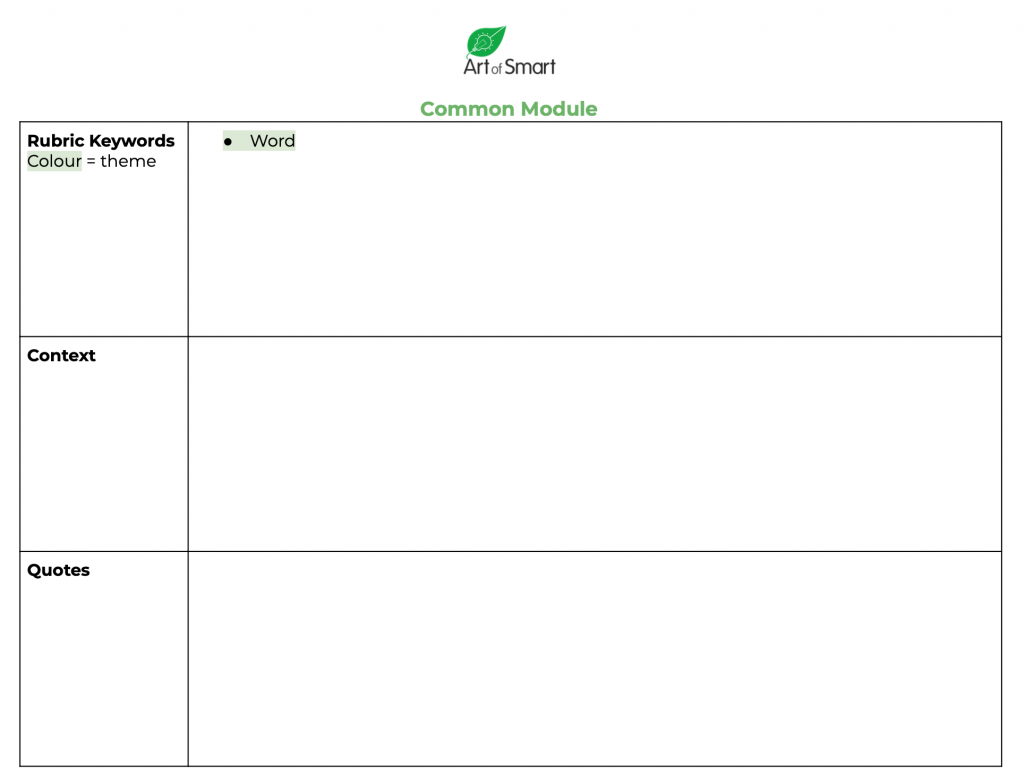Not sure how to structure your English notes?
You’ve come to the right place!
Check out one of our English tutors, Layton’s approach that will give you all you need to know to write a comprehensive set of HSC English notes!
Why should I make HSC English notes?
Step 1: Identify keywords in the rubric
Step 2: Research the context
Step 3: Find quality quotes
Notes Template!
Step 4: Use them!
Why should I make HSC English notes?
Most people seem to think English lacks structure but what all of our tutors will tell you is that this is very much not the case!
Layton says like maths, there are formulas you can reuse!
This methodical approach should make the subject a whole lot more enjoyable.
These notes are designed to keep you on track and focused on the question at hand.
By creating an amazing point of reference, you save time by no longer having to take ages prepping for your essays!
Layton’s three easy steps for efficient English notes below!
Step 1: Identify keywords in the rubric
Layton says that it is critical to know the rubric and how it interrelates to everything you do in English.
In terms of a TEE format, rubric keywords are typically your effect!
For each module, there are rubrics you can read.
To find these go to NESA (you can click here), select your English course, ‘Go to syllabus’, and then pick ‘Modules’.
Some rubric keywords can be found in our guides under each of the modules here!
Have a read through and note down the keywords for each module.
These are likely the words most repeated, however do feel free to explore any other ideas in the rubric!
Once you have those, memorise them and pepper them into every essay you do.
By using these words, you have already upped your game as the teachers know you know what they want!
If you’re unsure of definitions make sure to search it up to get a better understanding of the concepts and find synonyms.
Remember, they’re also looking for a wide vocabulary!
Layton says you should be able to prepare for anything they throw at you by studying the rubric so pay attention!
Want a practical note-taking routine you can use? Here’s what to do before, during, and after class to stay organised and work efficiently!
Step 2: Research the context
Context is just as important as themes when it comes to English.
Think about it, have you ever heard someone say a movie quote without context?
Not funny.
Make sure your marker finds what you’re saying ‘funny’ by letting them know you know what’s gone down.
It’d be pretty difficult and awkward to argue one thing when context points in a different direction.
Through research on context, you should be able to gain clarity on what the composer is trying to convey.
By understanding the composer’s intention, you will be able to gain more direction and structure for your essays.
While originality is also valued, don’t be afraid to seek out supporting evidence!
I’m sure you’re all familiar with SparkNotes and it is great for this!
Don’t only use it for quotes!
Sometimes reading about the author or composer’s life can also help as naturally their values inform their writing.
These values are perfect to include your essays.
Context may be used to supplement thematic effects or on its own, if there is enough relevance – this could be due to the style of speech, visual techniques and more!
Step 3: Find quality quotes
We all know you can’t have a Band 6 essay without quotes.
While memorising quotes can be a pain, it’s a great way to bring up that word count as well!
Finding quotes is a key part of good English notes, you shouldn’t be looking for new ones with every essay!
Dedicate time to creating a quote bank so that you can ensure you have the perfect evidence for any question.
Don’t let yourself get in a situation where you are massively stretching to make a point!
It’s best to find one that uses a good literary technique and evidently demonstrates your theme.
This will make it a whole lot easier for you as well, because you yourself know what the composer is talking about!
Each of your quotes must have a technique!
A extensive list of literary can be found here!
You can also check out a list of visual English techniques here!
This will make you and the marker’s job a whole lot easier.
Don’t miss out on those easy marks.
Notes Template!
We’ve created a simple template, Layton’s notes so you don’t have to!
Click here to access!
Once you’ve filled out the table, Layton recommends grouping them into themes and ideas.
An easy way to do this is colour coding!
Step 4: Use them!
The most important part of your notes is making sure you utilise them!
At the end of the day, your essays are what will determine your mark in English so…
Be sure to actually use your notes!
This means writing practice essays (hopefully weekly!) and handing them in for feedback.
Find out where you can improve, whether this be your writing or gaps in your notes.
The most important thing to do is review and revise!
Try to write your essays using this note structure and see how you go.
Test them using our practice questions here!
Layton’s notes not quite working for you? No worries!
Check out another method here!
Looking for some extra help with HSC English?
We have an incredible team of HSC English tutors and mentors like Layton who are new HSC syllabus experts!
We can help you master your HSC English related text and ace your upcoming HSC English assessments with personalised lessons conducted one-on-one in your home or at our state of the art campus in Hornsby!
We’ve supported over 6,000 students over the last 11 years, and on average our students score mark improvements of over 19%!
To find out more and get started with an inspirational HSC English tutor and mentor, get in touch today or give us a ring on 1300 267 888!
Gabrielle Wong is currently the Digital Marketing Assistant at Art of Smart. She is a second year student at the University of Sydney studying a Bachelor of Arts/Advanced Studies majoring in Media and Communications and Marketing.




